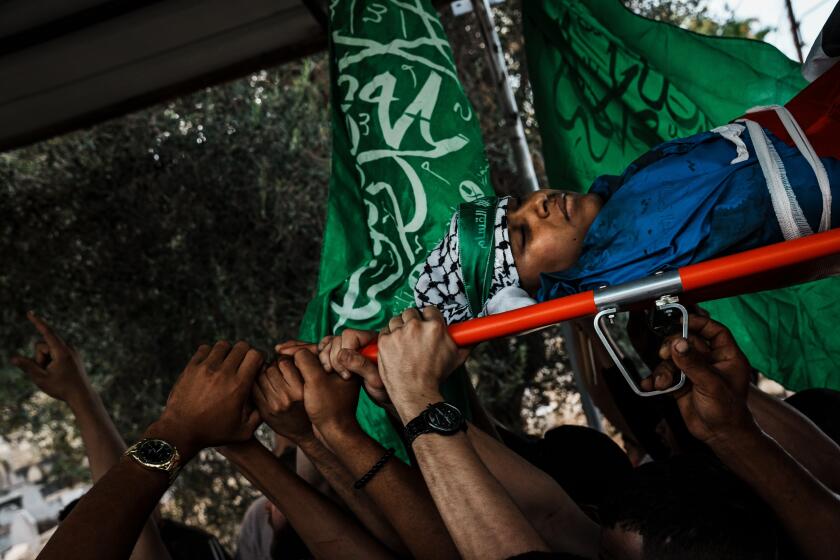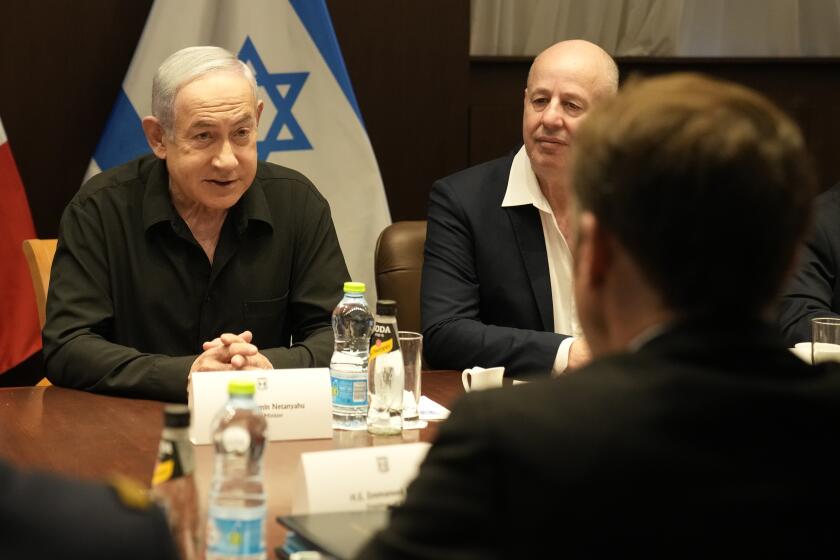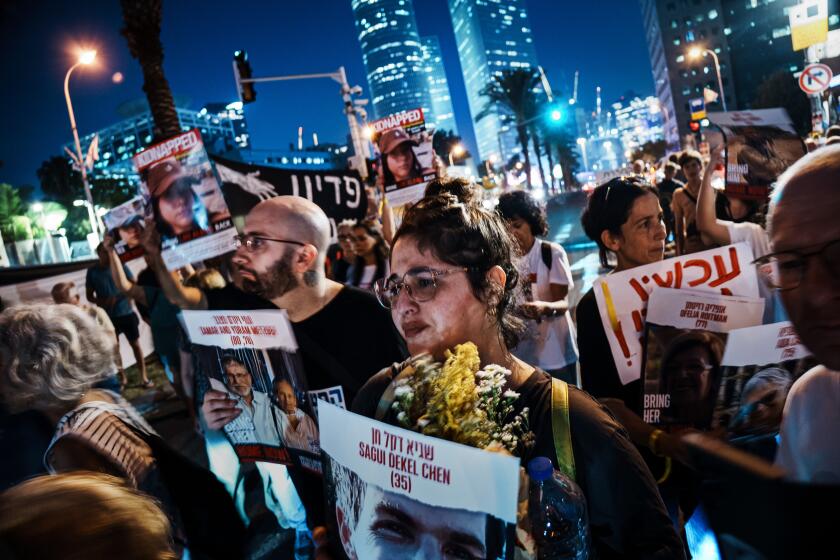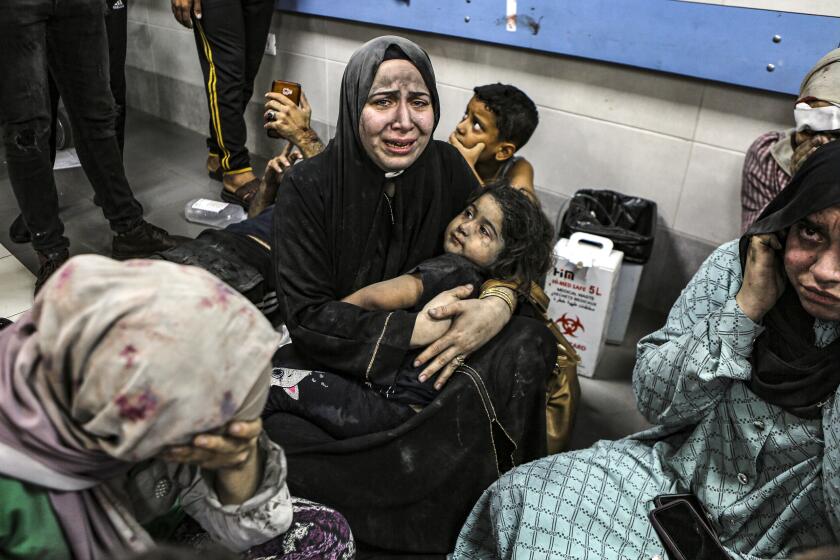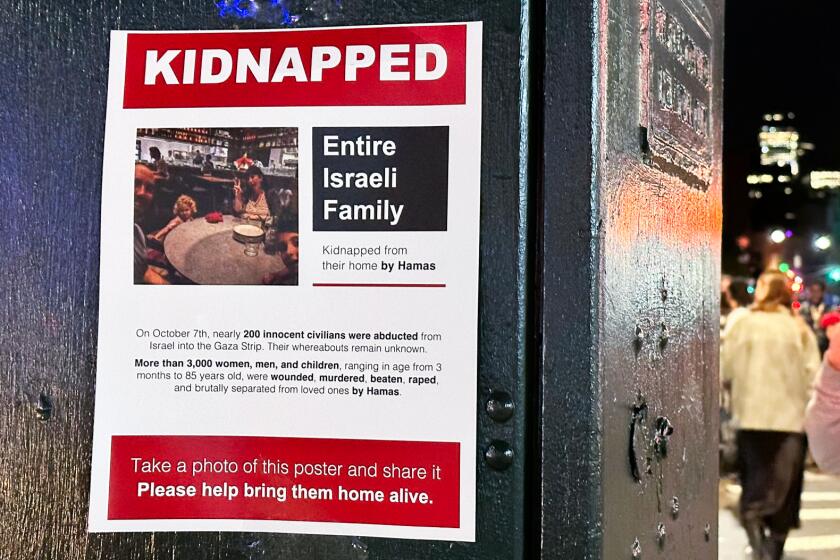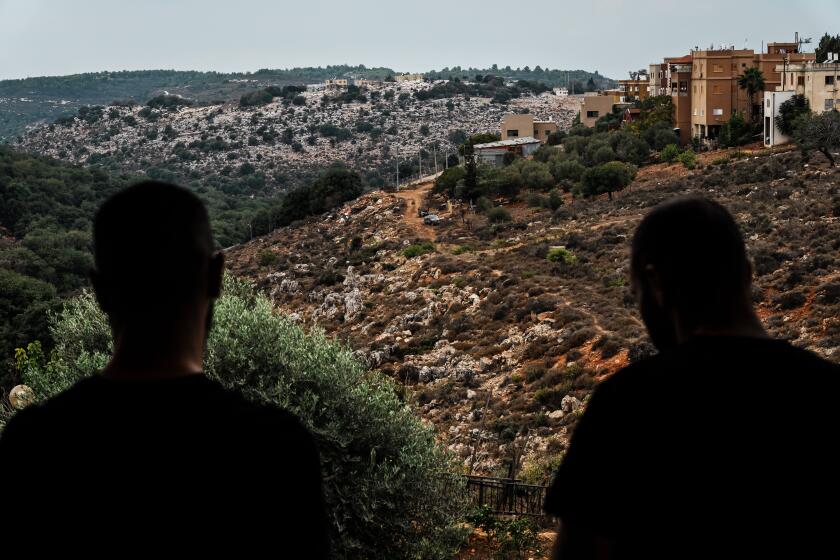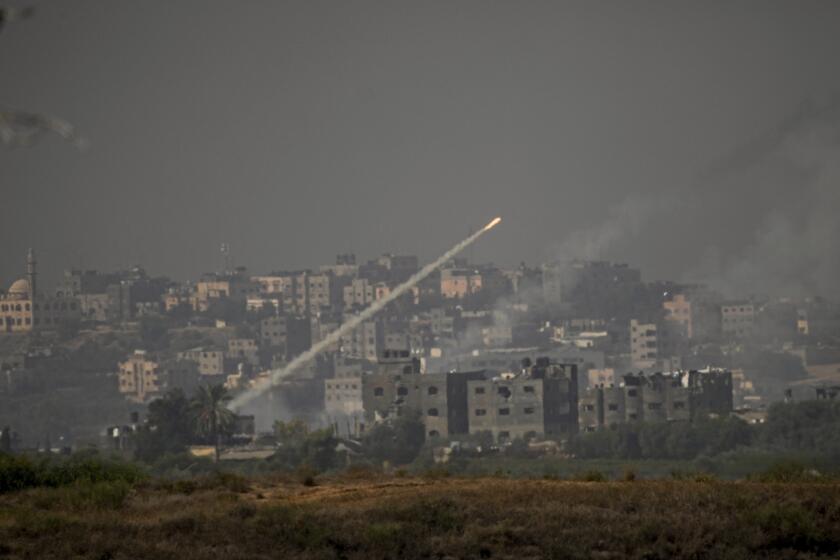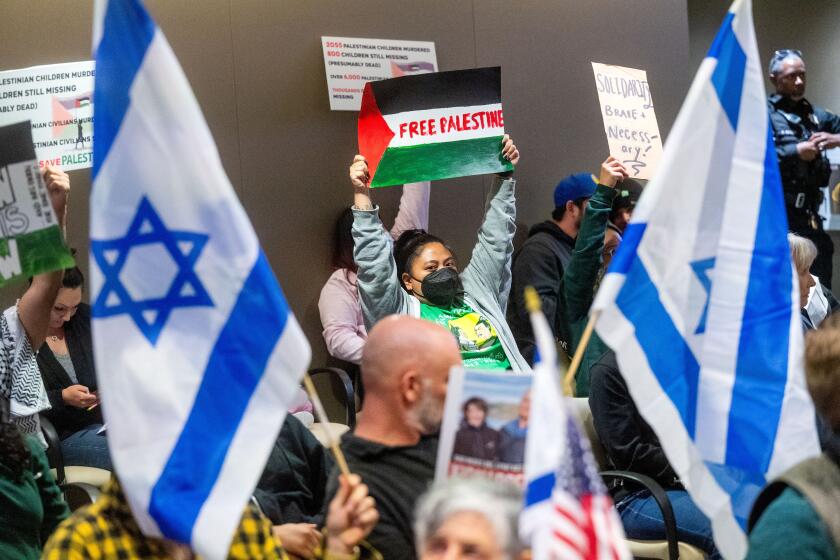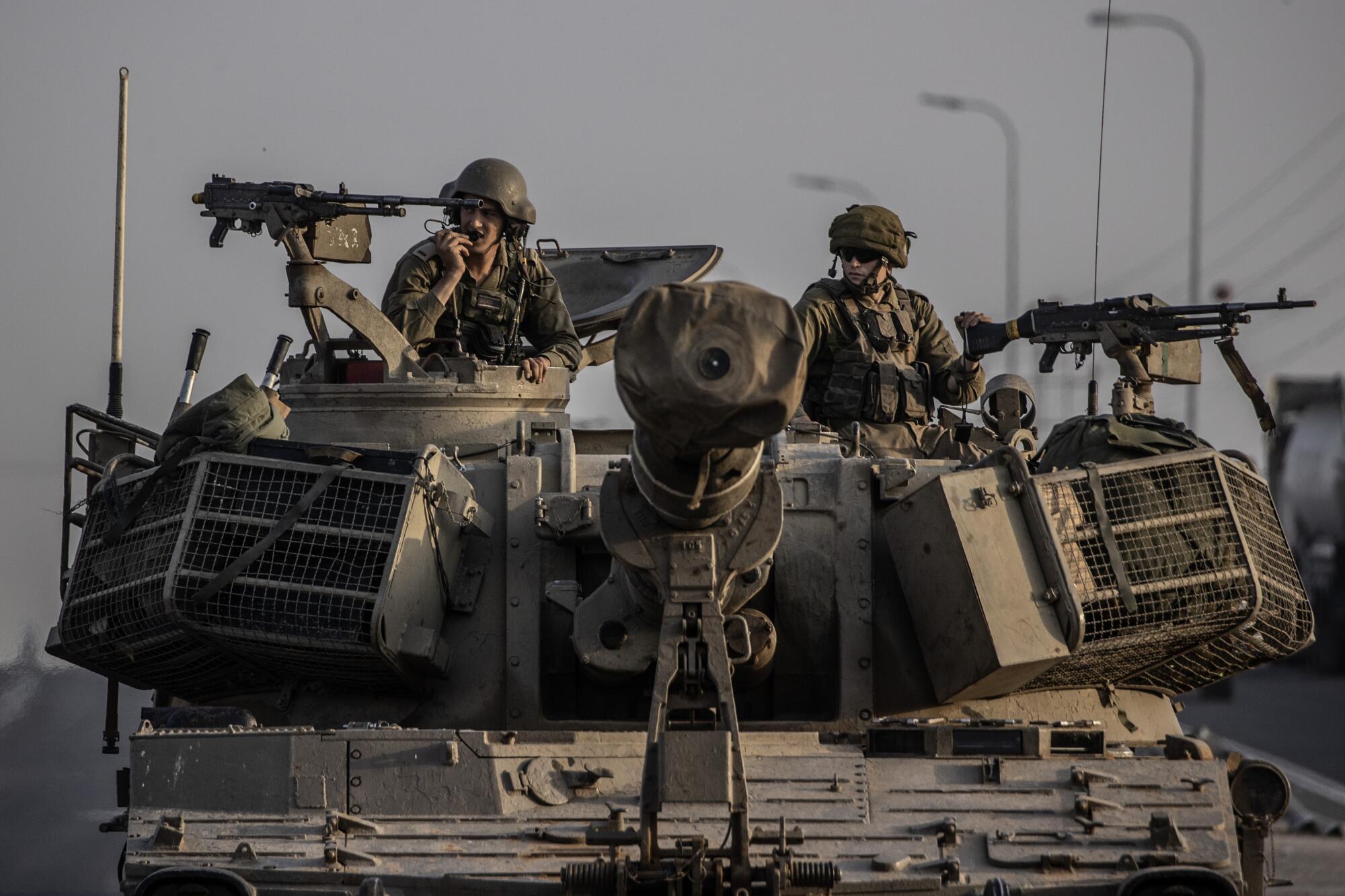
- Share via
DEIR AL BALAH, Gaza Strip — Israel knocked out internet and other communications in the Gaza Strip in stepped-up bombardment Friday night, largely cutting off its 2.3 million people from the outside world and one another, as Israel’s military said it was expanding ground operations in the besieged territory.
The military’s announcement signaled it was moving closer to an all-out invasion of Gaza, where it has vowed to crush the ruling Hamas militant group after its bloody incursion in southern Israel three weeks ago.
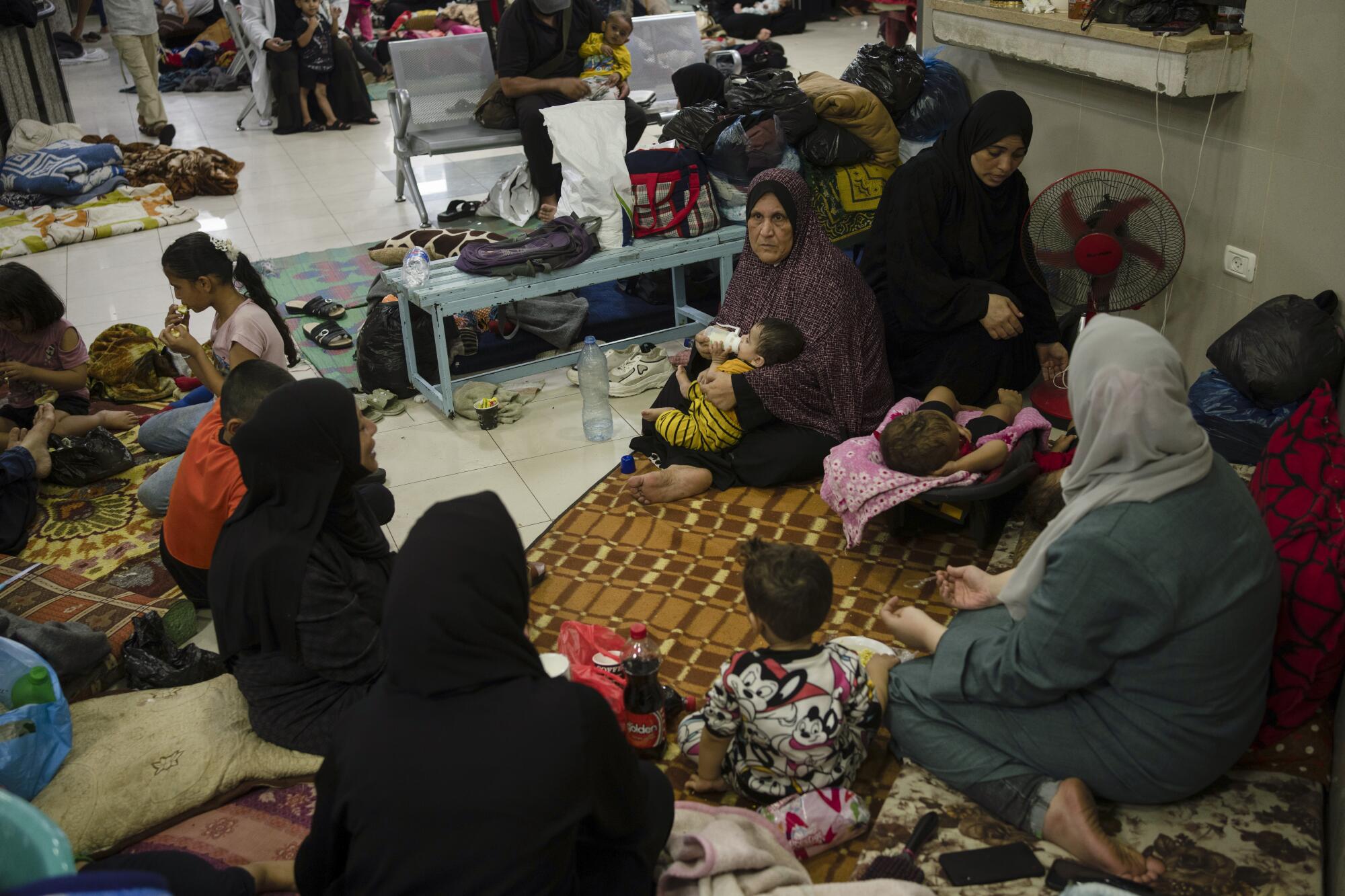
Explosions from continuous airstrikes lighted up the sky over Gaza City for hours after nightfall. The Palestinian telecom provider Paltel said the bombardment caused “complete disruption” of internet, cellular and landline services. The cutoff meant that casualties from strikes and details of ground incursions could not immediately be known.
Already plunged into darkness after most electricity was cut off weeks ago, Gazans were thrown into isolation, huddling in homes and shelters with food and water supplies running out.
Violence surges in the West Bank as Israel increases raids to root out militants. Palestinians say the military is using the war as an excuse to crack down.
Relatives outside Gaza panicked after their messaging chats with families inside suddenly went dead and calls stopped going through.
“I was so scared this was going to happen,” said Wafa Abdel Rahman, director of a Palestinian feminist organization based in the West Bank city of Ramallah. She said she hadn’t heard for hours from family in central Gaza.
“We’ve been seeing these horrible things and massacres when it’s live on TV, so now what will happen when there’s a total blackout?” she said, referring to scenes of families that have been crushed in homes by airstrikes over the past weeks.
Lynn Hastings, United Nations humanitarian coordinator for the occupied territories, posted on X, formerly known as Twitter, that without phone lines and internet, hospitals and aid efforts would be unable to operate.
The Red Crescent said that it could not contact its medical teams and that residents could no longer call ambulances, meaning rescuers would have to chase the sound of explosions to find the wounded. International aid groups said they were able to reach only a few staff members using satellite phones.
The Committee to Protect Journalists expressed alarm, saying the world “is losing a window into the reality” of the conflict. It warned that the information vacuum “can be filled with deadly propaganda, dis- and misinformation.”
Rear Adm. Daniel Hagari, an Israeli military spokesman, said ground forces were “expanding their activity” Friday evening in Gaza and “acting with great force ... to achieve the objectives of the war.” Israel says that its strikes target Hamas fighters and infrastructure and that the militants operate among civilians, putting civilians in danger.
Israelis fault Prime Minister Benjamin Netanyahu for security failures that set the stage for war. Few see a path to leadership change amid the crisis.
The Hamas media center reported heavy nighttime clashes with Israeli forces, including tanks, at several places by the border fence. Asked about the report, the Israeli military reiterated early Saturday that it had been carrying out targeted raids and expanding strikes with the aim of “preparing the ground for future stages of the operation.”
Israel has amassed hundreds of thousands of troops along the border with the Palestinian territory ahead of an expected ground offensive. Earlier Friday, the military said ground forces conducted their second hours-long incursion inside Gaza in as many days, striking dozens of militant targets over the last 24 hours.
Defense Minister Yoav Gallant told a small group of foreign reporters that Israel expects a long and difficult ground offensive into Gaza soon. It “will take a long time” to dismantle Hamas’ vast tunnel network, he said, adding that he expected a lengthy phase of lower-intensity fighting as Israel destroys “pockets of resistance.”
His comments pointed to a potentially grueling and open-ended new phase of the war after three weeks of relentless bombardment. Israel has said it aims to crush Hamas’ rule in Gaza and its ability to threaten Israel. But an invasion’s endgame and how Hamas’ defeat will be measured remain unclear. Israel says it does not intend to rule the tiny territory, but it does not say whom it expects to govern — even as Gallant suggested a long-term insurgency could ensue.
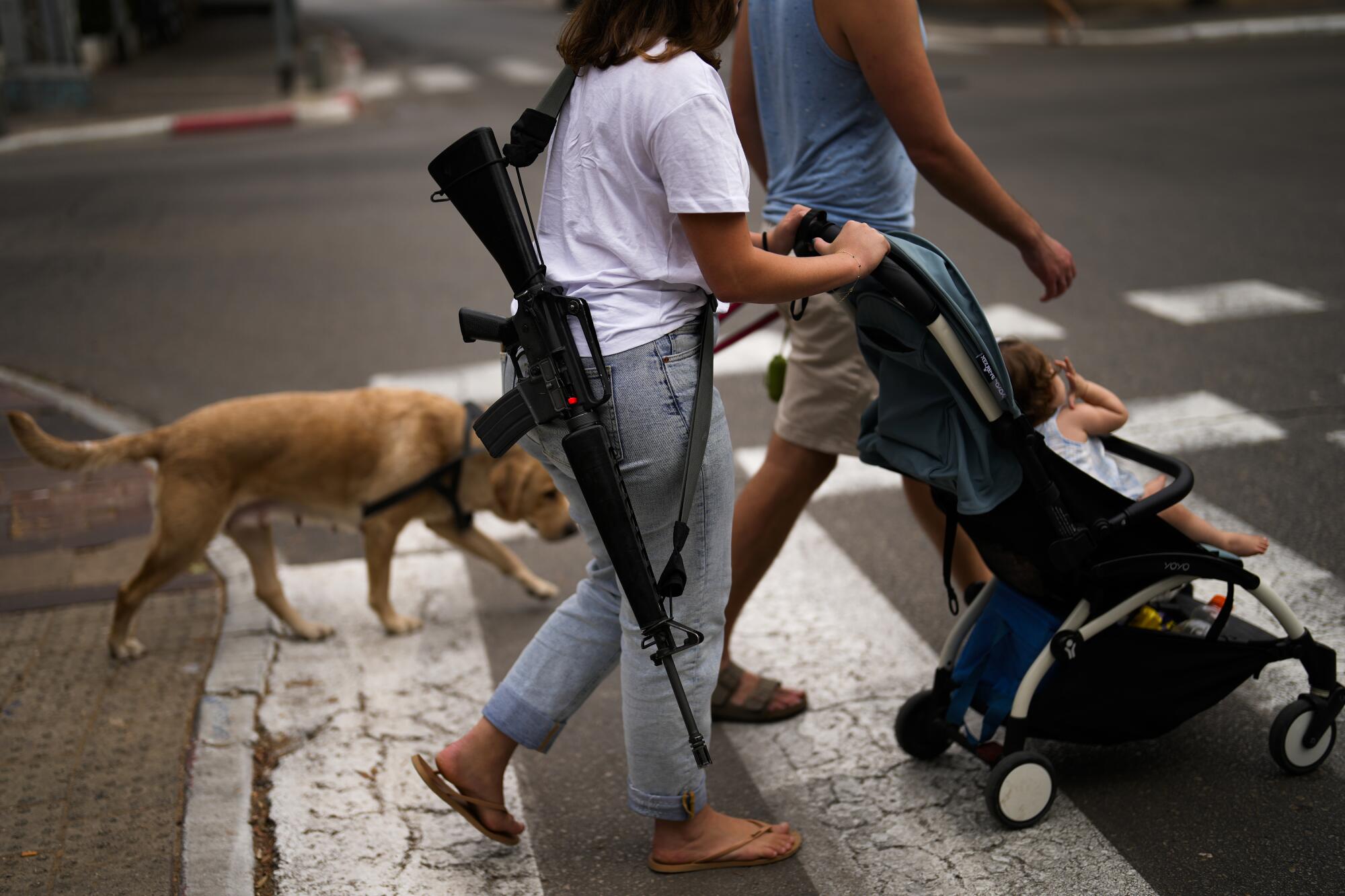
Israel-Hamas war: In a national vigil of sorts, Israelis hope for the return of more than 220 people seized by militants and believed held in Gaza.
The Palestinian death toll has soared past 7,300, more than 60% of the victims minors and women, according to the Hamas-run territory’s Health Ministry. A blockade on Gaza has meant dwindling supplies of food, fuel, water and medicine, and the U.N. warned that its aid operation helping hundreds of thousands of people was “crumbling” amid nearly depleted fuel.
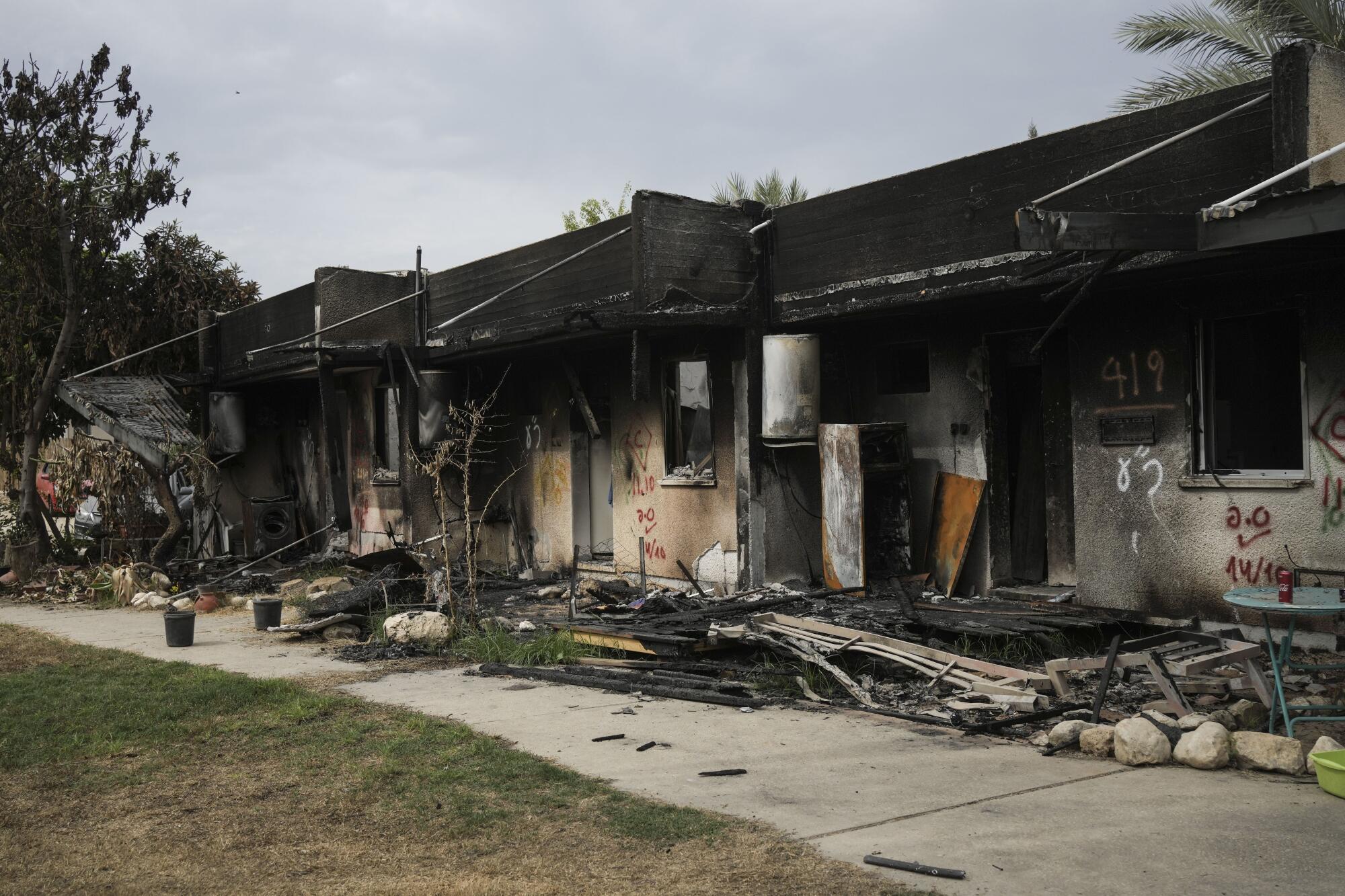
More than 1,400 people in Israel, mostly civilians — from infants to the elderly — were slain during Hamas’ Oct. 7 attack, and at least 229 hostages were taken into Gaza, according to the Israeli government.
The overall number of reported deaths far exceeds the combined toll of all four previous wars between Israel and Hamas, estimated at about 4,000.
Israel and the Palestinian militant group Hamas appear set to go head-to-head on the ground in Gaza. What’s each side’s endgame?
The U.N. General Assembly on Friday approved a nonbinding resolution calling for a “humanitarian truce” in Gaza. The 193-member world body voted 120 to 14 with 45 abstentions after rejecting a Canadian amendment backed by the United States. It would have condemned the Oct. 7 Hamas attack and demanded the immediate release of hostages, which is not mentioned in the Arab-drafted resolution.
Riyad Mansour, the permanent observer of the state of Palestine to the United Nations, called the General Assembly “more courageous, more principled” than the U.N. Security Council, which has failed to reach agreement on a resolution. Israel’s U.N. ambassador, Gilad Erdan, called it “a day that will go down in infamy.”
The conflict has threatened to ignite a wider war across the region. Arab nations — including U.S. allies and ones that have reached peace deals or normalized ties with Israel — have raised increasing alarm over a potential ground invasion, which would be expected to bring even higher casualties amid urban fighting.
Jordanian Foreign Minister Ayman Safadi warned on X that the “outcome will be a humanitarian catastrophe of epic proportions for years to come.”
U.S. warplanes struck targets in eastern Syria that the Pentagon said were linked to Iran’s Islamic Revolutionary Guard Corps after a string of attacks on American forces. Two mysterious objects hit towns in Egypt’s Sinai Peninsula, wounding six people. Israel’s Foreign Ministry blamed Yemen’s Iranian-backed Houthi rebels, who have tried to fire rockets toward Israel since the war began.
The loss of internet and phones in Gaza deals a further blow to a medical and aid system that relief workers say was already on the verge of collapse, overwhelmed by wounded and running out of supplies under Israel’s weeks-long seal. More than 1.4 million people have fled their homes, nearly half crowding into U.N. schools and shelters. Aid workers say a trickle of aid Israel has allowed to enter from Egypt in the last week is a tiny fraction of what is needed.
Gaza hospitals have been scrounging for fuel to run emergency generators that power incubators and other lifesaving equipment.
Gallant said Israel believes that Hamas would confiscate any fuel that enters. He said Hamas uses generators to pump air into its hundreds of miles of tunnels, which originate in civilian areas. He showed reporters aerial footage of what he said was a tunnel shaft built right next to a hospital.
“For air, they need oil. For oil, they need us,” he said.
Late Friday, the army released photos showing what it claimed were Hamas installations in and around Gaza’s largest hospital, Shifa. Israel has made such claims before, but it declined to say how it obtained the photos.
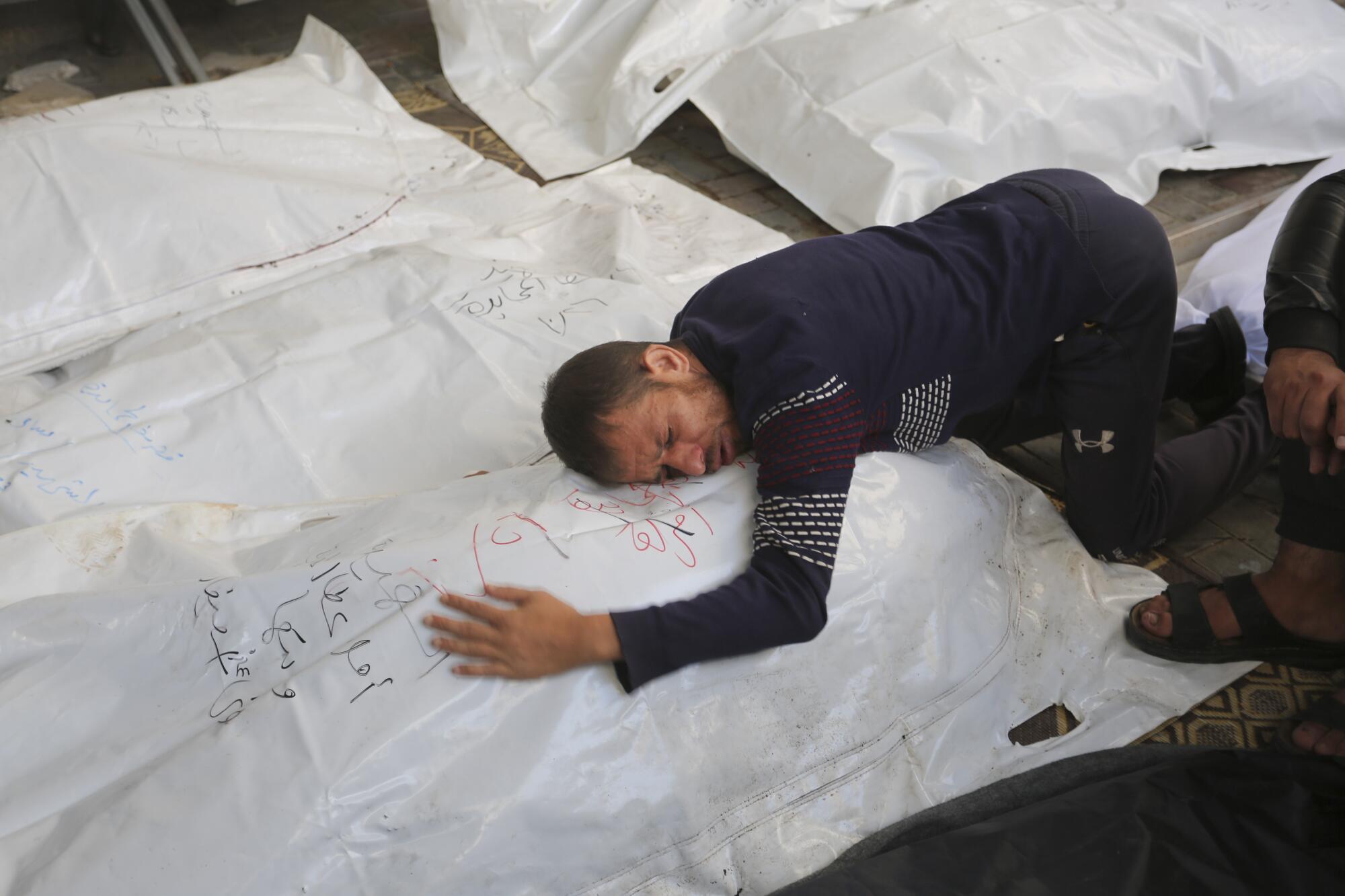
Little is known about Hamas’ secretive tunnels and other infrastructure, and it wasn’t possible to independently confirm Gallant’s claims.
Speaking at Shifa Hospital in Gaza City, Hamas media chief Salama Maroof called Israel’s claims “lies” and said they were “a precursor for striking this facility.”
“I ring the alarm bell. There is imminent danger hovering above the medical facility” and those in it, Maroof said. The hospital has been overwhelmed by thousands of patients and wounded, and around 40,000 displaced Gaza residents have crowded in and around its grounds for shelter, the U.N. says.
Two Israeli street artists in New York started the project to call attention to those taken hostage. It has become a reminder of how deeply polarizing the war is.
Asked whether the military plans to target Shifa, Hagari said, “We will not be able to allow terror activity against Israel from hospitals and we will have to, together with the rest of the world, confront this red flag.” He said Hamas uses “its own population as a human shield.”
Hundreds of thousands remain in northern Gaza, despite Israel ordering them to evacuate to the south and saying that those who remain might be considered “accomplices” of Hamas. Israel, however, continues to bomb some areas of southern Gaza.
On Israel’s border with Lebanon, residents are worried that groups like Hezbollah will join a war that eventually spirals into a regionwide conflict.
Hamas’ attack on Israel has highlighted the differences among the foreign policy instincts — and experience — of the leading Democratic candidates for U.S. Senate in California.
The damage to Gaza from nearly three weeks of bombardment was apparent in satellite photos of several locations taken before the war and again in recent days.
Entire rows of residential buildings disappear in the photos, reduced to smears of dust and rubble. A complex of 13 high-rises by the sea was pounded to dust near Gaza City’s Shati refugee camp, leaving only a few tottering bits of facade, according to the photos by Maxar Technologies.
Ancestors and histories are summoned but nothing has brought resolution to a conflict that again threatens to ignite the Middle East. This war between Israel and Hamas is scarier than the ones that came before.
The city of Richmond voted to support the Palestinian people in Gaza with a controversial resolution after a marathon City Council meeting.
More to Read
Sign up for Essential California
The most important California stories and recommendations in your inbox every morning.
You may occasionally receive promotional content from the Los Angeles Times.
